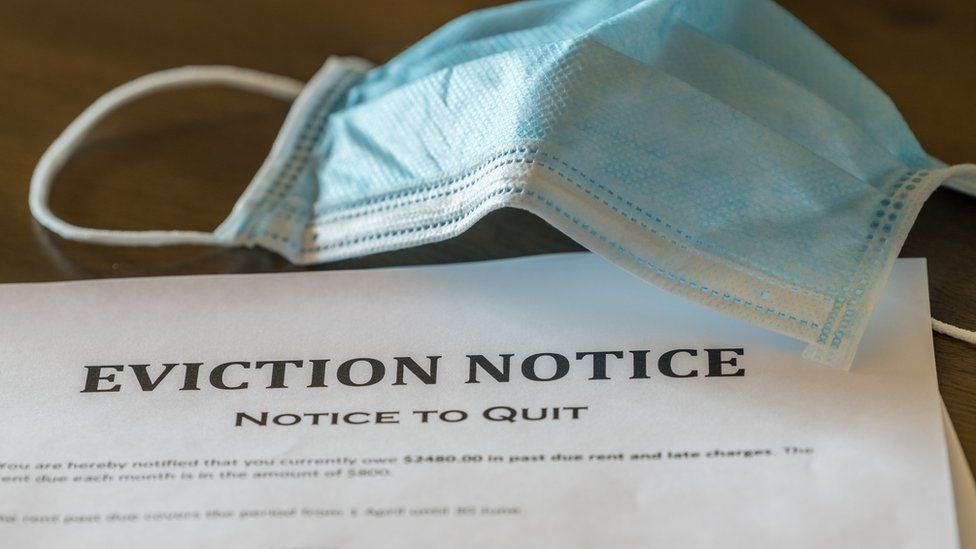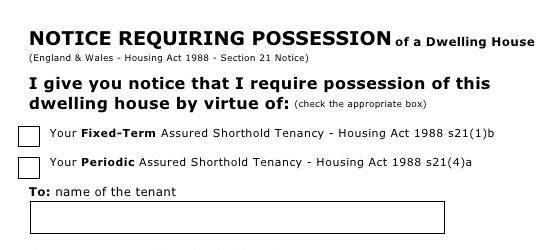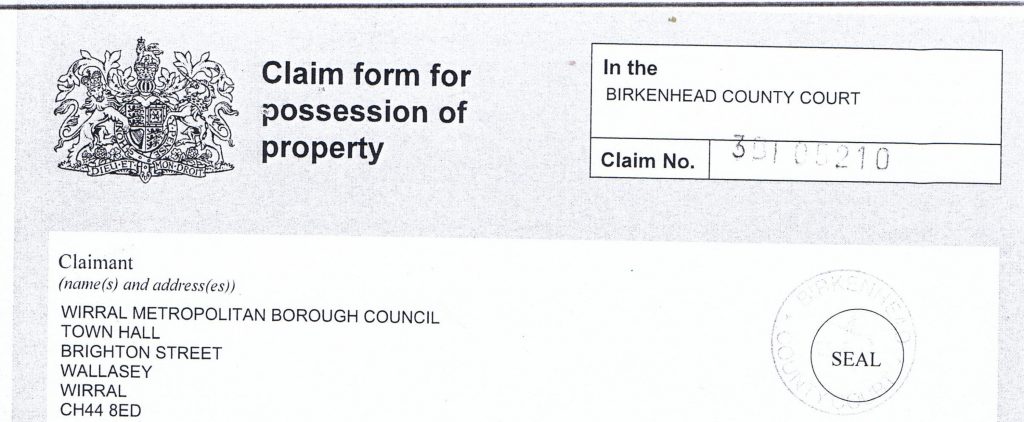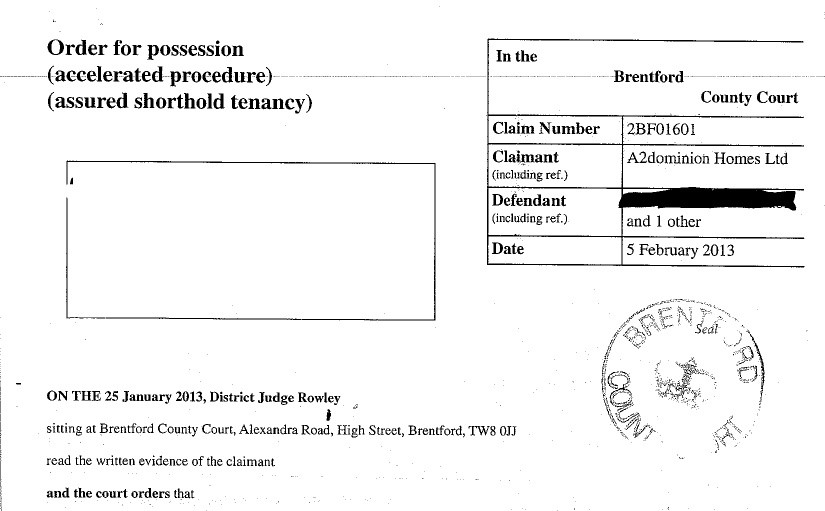
If you have an upcoming possession hearing at Chelmsford court please see our Housing Law page – we provide duty advice in person at the court in partnership with the Citizens’ Advice Bureau and are also happy to provide free legal advice in advance.
The rules on possession claims (more commonly called evictions) have changed a number of times since the start of the pandemic, as the government has tried to limit courts’ caseloads and avoid too many people having to leave their homes during a health emergency.
But the courts are slowly getting back into gear and re-starting the hearing of possession claims – so here’s a summary of things as they stand. Many will be facing eviction proceedings in the coming months, so stay informed and seek advice to make sure you get help to stay in your home if possible.
Stage One – Giving Notice

The first stage for an eviction is when the landlord serves notice – this is a document served by the landlord which tells a tenant why they are being evicted and the date that their tenancy will come to an end.
Please don’t ignore a notice from your landlord! Get advice as soon as you can.
The Coronavirus Act extended the notice period for most types of evictions to as much as six months. This gives you much more time to get advice, to talk to your landlord and to find out if you qualify for any benefits that will help you pay your rent.
These extended periods apply to any notice served prior to the 31 of March 2021.
Stage Two - Getting A Court Order

An important thing to remember is that your landlord cannot force you to leave without an order of the court, called a “possession order”.
It is important that you don’t leave your home voluntarily on the date that your tenancy ends, unless you have somewhere else to go – leaving voluntarily could affect whether the local authority is under a duty to house you if you’re made homeless.
Claims started after 03 August 2020
If you received notice of the proceedings from the court after the 3rd of August 2020, the usual rules apply – the court will book the first available hearing at which the parties can make their arguments (see “substantive hearing” below.
If you receive a document from the court do not ignore it – check the notice and get legal advice. If it is incorrect or you otherwise think you are entitled to stay in the property you need to file a defence, and the court should send you a defence form to fill out. Ask for advice to make sure you fill this out correctly.
In ordinary times, the court is supposed to ensure a hearing takes place within eight weeks of receiving the landlord’s claim – but this requirement has been relaxed and it may take a long time for your case to be heard. The most serious cases (such as those involving anti-social behaviour and large rent arrears) will be given priority.
This gives more time for you to talk to your landlord and see if you can reach an agreed solution. If no solution can be agreed, use this time to work out what you will do if you are evicted – contact your local housing authority if you don’t think you will be able to find anywhere to live.
And of course – seek legal advice! Central Law offers free advice sessions for housing law issues, and legal aid is available for eviction cases where there is a risk of homelessness (though Central Law does not take legal aid cases).
Claims started before 03 August 2020
If you received a notice from the court before the 3rd of August 2020, the following will apply.
Landlords will need to:
- serve a “reactivation notice” to re-start the eviction proceedings;
- provide any information they have about the effect of the pandemic on both the landlord and the tenant;
- provide an updated rent account for the previous two years (if the eviction is for not paying rent).
The reactivation notice asks for more information on the claim so that certain types of case can be prioritised, such as those relating to anti-social behaviour, or where there are large rent arrears of more than 12 months’ rent.
This reactivation notice must be filed by 30 April 2021, otherwise the claim will be stayed.
Review hearing
The court will arrange a “review hearing” for the judge to check the documents provided with the reactivation notice and, if they are in order, to decide whether the case should be prioritised and list a hearing.
Whilst the parties will not be present for these review hearings, housing duty advice should still be available – check with the court whether you will need to visit the court in person to speak with the duty adviser, or whether this can be done remotely.
Advice might still be necessary even for the review hearing – for example if you want to make sure your case is “Covid-19 marked”, which tells the court that either the tenant or landlord, or both, have suffered serious hardship due to the pandemic.
Substantive Hearing
This second hearing is the important one where the parties will attend court to be heard by the judge, who will decide whether or not to grant an order for possession. In many cases the judge will have no choice but to give the order, but sometimes there can be room to delay possession, or agree a payment plan if the tenant is being evicted for non-payment of rent.
It is a good idea to come prepared with evidence of your financial situation and ability to pay – this might help you and the landlord reach an agreement. Also (we can’t stress this enough!) be sure to seek legal advice before the hearing – in rare cases there may be a reason why the court should not give possession, and seeking legal advice could help to identify any problems with the landlord’s case.
Legal aid is available for eviction cases – see the useful links at the bottom of the page to find out more.
Stage Three - The Eviction

If a person does not leave the property voluntarily on the date stated in the court order, the landlord must get permission from the court to forcibly evict them. This is called a “warrant of possession” and allows bailiffs to enter the property with force and remove anyone present.
Because of the pandemic, courts cannot grant permission for forcible eviction until 31 March 2020, except in the following cases:
- Against trespassers
- Anti-social behaviour and domestic violence
- Persistent non-payment of rent or rent arrear exceed at least 6 months’ rent
It is not a good idea to wait until you are removed by force – if you have nowhere to go, make an application to your local housing authority to get temporary accommodation.
The threat of being kicked out of your home can cause huge stress and we all understand the temptation to ignore the problem and hope it goes away – but there are many lawyers, charities and housing officers out there whose job it is to help you. Reach out and don’t face eviction alone!
Useful Links
Getting legal aid: https://www.gov.uk/check-legal-aid
Get help with housing: https://www.gov.uk/homelessness-help-from-council
Housing advice from Shelter: https://england.shelter.org.uk/housing_advice

